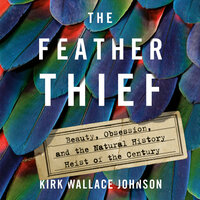You need to sign in or sign up before continuing.
Take a photo of a barcode or cover
1.92k reviews for:
The Feather Thief: Beauty, Obsession, and the Natural History Heist of the Century
Kirk Wallace Johnson
1.92k reviews for:
The Feather Thief: Beauty, Obsession, and the Natural History Heist of the Century
Kirk Wallace Johnson
informative
medium-paced
1. Alfred Wallace’s story is so compelling. It’s such a shame that he has been (to this point) forgotten by history.
2. Victorian fly tying is a fucking wild hobby. I’m sure there’re decent tiers out there, but most of the ones you’ll meet in this book are straight up scumbags.
3. Biggest scumbag of all is the sociopath Edwin Rist. I’m hoping karma catches up to him someday.
Quotes:
- Wallace worried that mankind’s need to possess such beauty would eventually lead to their extinction.
- As he marveled on their extraordinary evolutionary journey, his thoughts turned worriedly toward the future. “It seems sad, that on the one hand such exquisite creatures should live out their lives and exhibit their charms only in these wild inhospitable regions . . . while on the other hand, should civilized man ever reach these distant lands . . . we may be sure that he will so disturb the nicely-balanced relations of organic and inorganic nature as to cause the disappearance, and finally the extinction, of these very beings whose wonderful structure and beauty he alone is fitted to appreciate and enjoy. “This consideration,” he concluded, “must surely tell us that all living things were not made for man.”
- “future ages will certainly look back upon us as a people so immersed in the pursuit of wealth as to be blind to higher considerations. They will charge us with having culpably allowed the destruction of some of those records of Creation which we had it in our power to preserve.” He challenged the antievolution religionists, “professing to regard every living thing as the direct handiwork and best evidence of a Creator, yet, with a strange inconsistency, seeing many of them perish irrecoverably from the face of the earth, uncared for and unknown.”
- In the early days of the American colonies, salmon ran in such great numbers that they could be speared from the riverbanks with a pitchfork. So common were they that they were ground up and used as crop fertilizer. The skies were darkened with great clouds of migrating birds—in 1813 John James Audubon once traveled for three straight days under a single eclipsing horde of Passenger Pigeons. The plains rumbled with bison herds so vast that it took one soldier six full days to pass through them on horseback.
- I smiled and said I would find it difficult to be as restrained as Prys-Jones and Adams were, had I been in their position. “We’re British. We’re not American,” Prys-Jones said.
- In an op-ed about the decision to drop Asperger’s from the DSM-V, Baron-Cohen wrote, “Psychiatric diagnoses are not set in stone. They are ‘manmade,’ and different generations of doctors sit around the committee table and change how we think about ‘mental disorders.’”
2. Victorian fly tying is a fucking wild hobby. I’m sure there’re decent tiers out there, but most of the ones you’ll meet in this book are straight up scumbags.
3. Biggest scumbag of all is the sociopath Edwin Rist. I’m hoping karma catches up to him someday.
Quotes:
- Wallace worried that mankind’s need to possess such beauty would eventually lead to their extinction.
- As he marveled on their extraordinary evolutionary journey, his thoughts turned worriedly toward the future. “It seems sad, that on the one hand such exquisite creatures should live out their lives and exhibit their charms only in these wild inhospitable regions . . . while on the other hand, should civilized man ever reach these distant lands . . . we may be sure that he will so disturb the nicely-balanced relations of organic and inorganic nature as to cause the disappearance, and finally the extinction, of these very beings whose wonderful structure and beauty he alone is fitted to appreciate and enjoy. “This consideration,” he concluded, “must surely tell us that all living things were not made for man.”
- “future ages will certainly look back upon us as a people so immersed in the pursuit of wealth as to be blind to higher considerations. They will charge us with having culpably allowed the destruction of some of those records of Creation which we had it in our power to preserve.” He challenged the antievolution religionists, “professing to regard every living thing as the direct handiwork and best evidence of a Creator, yet, with a strange inconsistency, seeing many of them perish irrecoverably from the face of the earth, uncared for and unknown.”
- In the early days of the American colonies, salmon ran in such great numbers that they could be speared from the riverbanks with a pitchfork. So common were they that they were ground up and used as crop fertilizer. The skies were darkened with great clouds of migrating birds—in 1813 John James Audubon once traveled for three straight days under a single eclipsing horde of Passenger Pigeons. The plains rumbled with bison herds so vast that it took one soldier six full days to pass through them on horseback.
- I smiled and said I would find it difficult to be as restrained as Prys-Jones and Adams were, had I been in their position. “We’re British. We’re not American,” Prys-Jones said.
- In an op-ed about the decision to drop Asperger’s from the DSM-V, Baron-Cohen wrote, “Psychiatric diagnoses are not set in stone. They are ‘manmade,’ and different generations of doctors sit around the committee table and change how we think about ‘mental disorders.’”
adventurous
informative
reflective
medium-paced
informative
mysterious
medium-paced
dark
informative
reflective
sad
medium-paced
dark
mysterious
medium-paced
Easy and quick read. Curious how the author also came to the conclusion of “insert shrug emoji”. Part 1 definitely wasn’t necessary and felt like it was added in to make the book a more “normal” book length because it didn’t fit the overall mood, tone, or vibe of the rest of the book. Parts 2 & 3 were much better. I could’ve used more here tbh. Overall an easy read and interesting!
I feel like I keep saying that I don't really like non-fic, but then end up reading and loving some of the non-fic i have read this year.
This book was fantastic, it was a great non-fic book that was about something SO bizarre yet so compulsively interesting. The author wove a beautiful narrative that kept me on the edge of my seat, and also stuck reading it till i finished.
I guess, if the non-fic is like the last few I have read, with a great narrative woven throughout, it really isn't that bad.
Also this is some non-violent true crime, who even knew that was a thing? (OK I did, I am just a murderino ;P )
This book was fantastic, it was a great non-fic book that was about something SO bizarre yet so compulsively interesting. The author wove a beautiful narrative that kept me on the edge of my seat, and also stuck reading it till i finished.
I guess, if the non-fic is like the last few I have read, with a great narrative woven throughout, it really isn't that bad.
Also this is some non-violent true crime, who even knew that was a thing? (OK I did, I am just a murderino ;P )
adventurous
informative
mysterious
medium-paced
The first bit - while interesting- was slow for me, but in pushing through, I was taken in.



